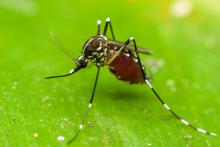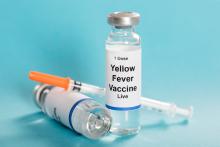Yellow Fever
Yellow fever is an illness spread by the bite of an infected mosquito.
Yellow fever virus is spread in tropical and subtropical areas of Africa and South America. Travel-associated cases are rarely reported in the United States.
Anyone who travels to areas where yellow fever is spread is at risk of getting the illness, but people who spend more time outdoors are at a higher risk of being bitten by an infected mosquito. It is important to take preventive steps when traveling to areas with yellow fever, especially in areas with ongoing outbreaks. Some preventive steps you can take are getting the yellow fever vaccine, wearing protective clothing, using insect repellents, and using mosquito netting.
For more tips, please visit our Mosquito Bite Prevention page. For country-specific travel information and recommendations, visit the CDC (Center for Disease Control and Prevention's) Traveler's Health page.
Yellow fever 101
Yellow fever is spread to humans through the bite of an infected mosquito.
Mosquitoes become infected with the virus by feeding on infected humans or other infected primates.
- After feeding on a human or other primate that has yellow fever, the virus can end up inside of the mosquito.
- Once infected with the virus, a mosquito can spread it to other humans when it takes another blood meal.
- Sick people can carry the virus in their blood shortly before they develop a fever and up to five days after becoming sick. During this time, if they are bitten by an uninfected mosquito they can transmit the virus to to the mosquito, continuing the cycle.
Yellow fever is a vaccine-preventable illness. Visit the CDC Yellow Fever Vaccine page for more information.
Symptoms of yellow fever start three to six days after being bitten by an infected mosquito.
Most people infected with yellow fever never develop symptoms. Those that do become sick may develop mild symptoms, such as sudden fever and headache, which usually improve within one week. However, one out of seven people who have mild symptoms will go on to develop severe illness. When this happens, the person will have mild symptoms, feel better for a short time (a few hours or a day), and then develop more severe symptoms. The infection is fatal in approximately 30-60% of those who develop severe illness.
If you have these symptoms after traveling to, or living in, an area with the yellow fever virus, contact your doctor immediately. If you have had yellow fever, you are unlikely to get it in the future.
First signs and symptoms
- Sudden onset of fever
- Chills
- Severe headache
- Back pain
- Body aches
- Nausea
- Vomiting
- Fatigue
- Weakness
Severe symptoms
- High fever
- Yellow skin (jaundice)
- Bleeding
- Shock
- Organ failure
- Death (in 30-60% of cases with severe illness)
There is currently no treatment for yellow fever. Over-the-counter pain relievers, such as Tylenol, may be given to relieve symptoms. Do not take aspirin or ibuprofen, as they can increase the risk of bleeding.
It is important to get plenty of rest and drink fluids. In severe cases, patients should be hospitalized for close observation and to receive supportive treatment.
If you have recently traveled to an area with yellow fever virus, and believe you may have yellow fever virus infection, contact your doctor.
The yellow fever vaccine is safe and effective. One dose of the vaccine provides lifelong protection against the virus for most people.
The vaccine is recommended for those aged 9 months or older who are traveling to or living in areas that are at risk for yellow fever. Some countries require that you have the yellow fever vaccine before entry.
Visit the CDC Travelers' Health page to see if your travel destination has yellow fever risk.
Vaccination against yellow fever and preventing mosquito bites are the best ways to prevent infection from yellow fever virus and other illnesses spread by mosquitoes.
Visit our Mosquito Bite Prevention page to learn how to prevent mosquito bites.
- Yellow Fever Frequently Asked Questions: Answers to frequently asked questions about yellow fever from CDC.
- Mosquito Bites Are Bad: An educational activity book for kids about preventing illnesses spread by mosquitoes.
Provider information
This is a Wisconsin disease surveillance category I disease:
- Report IMMEDIATELY by telephone to the patient's local public health department or their designee. In addition to the immediate report, within 24 hours, submit a case report electronically through the Wisconsin Electronic Disease Surveillance System (WEDSS), or by mail or fax using an Acute and Communicable Disease Case Report, F-44151 (Word) or by other means.
- Information on communicable disease reporting
Wisconsin case reporting and public health follow-up guidelines
- Yellow Fever EpiNet, P-01929 (PDF): A yellow fever case reporting and investigation protocol for health professionals.
- Arbovirus Management Protocol, P-00894 (PDF): Information for arboviral disease management, including surveillance, testing, reporting, and follow-up, in humans and animals.
- Yellow Fever For Healthcare Providers: CDC page with information on clinical and laboratory evaluation, diagnostic testing, yellow fever vaccine, and testing for vaccine adverse events.
- Yellow Fever Vaccination Center Certification: DHS webpage with information on yellow fever vaccine certification.
Questions about illnesses spread by mosquitoes? Contact us!
Phone: 608-267-9003 | Fax: 608-261-4976




